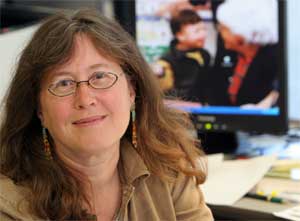 |
| "These children can do very well in acquiring two languages," says Dr. Elizabeth Kay-Raining Bird. (Pearce photo) |
The language abilities of children with Down syndrome may exceed the expectations of professionals who work with them on a regular basis, according to a new study based at Dalhousie.
These children have traditionally been discouraged from becoming bilingual by some speech language pathologists and other professionals due to perceived difficulties, says Dr. Elizabeth Kay-Raining Bird. The reality, according to her teamÕs findings, does not support this practice.
ÒParents of special needs children including those with Down syndrome are frequently counseled away from bilingualism without the benefit of research to show how capable they actually can be. Ours is the first group study that documented that children with Down syndrome can become bilingual. There is no evidence in our study to suggest input should be restricted to a single language. In fact, these children can do very well in acquiring two languages.”
The preliminary results of this study have enormous implications for children with Down syndrome and their families, and the professionals who work with them.
|
Dr. Kay-Raining BirdÕs research is just one of 11 projects at Dalhousie University to receive new federal funding from The Social Sciences and Humanities Research Council of Canada (SSHRC). The recipients of the SSHRC Standard Research Grants program were recently announced, with an investment of $77.8 million supporting 2,800 projects across Canada.
Dr. Kay-Raining Bird and her co-investigators Patricia Cleave of Dalhousie University and Natacha Trudeau and Ann Sutton from the University of Montreal received $101,002 in funding for ongoing study into The Language Abilities of Bilingual Children with Down Syndrome. Dr. Kay-Raining Bird is a professor at Dalhousie and a speech-language pathologist. Her research interest areas include child language and literacy development and disorders, with a particular focus upon Down syndrome and autism.
This latest round of funding allows Dr. Kay-Raining BirdÕs team to continue with this multi-year project for an additional three years. By the end of the grant, they will have examined the same set of children for six years. Their research over the years has examined whether children with Down Syndrome can become bilingual and to what extent, and also whether bilingualism has affected their developmental trajectory.
